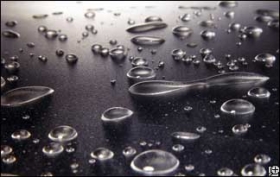Grease? New Coating Comes Clean With Water

Removing oily smudges from mirrors, countertops or fabrics usually
requires some elbow grease... and a strong soap or solvent.
A new coating developed by researchers at Purdue University promises
that grease stains can be wiped away with plain old water.
Incorporating this material into cleaning products, paints or
sealants could reduce the need for environmentally damaging solvents and
phosphate-containing detergents, the researchers say.
Phosphate detergents can kill aquatic life by allowing algae and
microbes to overgrow bodies of water, suffocating other animals by
consuming the dissolved oxygen.
The new coating is made by binding a water-loving molecule to a
Teflon-like molecule that repels oil. This pairing makes for a surface
that prevents oil from sticking to it, while also allowing it to be wet
by water.
"Most surfaces that repel oils are inherently very water repellant as
well. This works great for making something 'non-stick', but when the
surface does get dirty, it's basically impossible to clean the oil off
without using soap," said polymer scientist Ryan Hayward of the
University of Massachusetts Amherst.
"Youngblood's group has introduced a clever twist to this picture by
directly incorporating soap-like components in their polymer coatings,"
he added.
"These materials are resistant to oils but at the same time can be
easily wet by water, meaning that an oil-coated surface can be cleaned
simply by rinsing with water. If these polymers can be made into robust
coatings or fabrics, they could have real potential for reducing the
amount of detergent that we use."
The first generation of the material was complicated and expensive to
make. It took a graduate student about a week under stringent conditions
to coat a piece of glass, Youngblood said.
The latest work simplifies the process, creating a compound that can be
mixed straight into a window cleaner, for instance.
"We are learning that our [new products] are not as good as our original
technology, but add other benefits in terms of ease of use," Youngblood
said. "One might have to make a tradeoff. "
The best quality coating might be worth the effort to apply to a
telescope or camera lens (the coating also has anti-fog properties), he
explained. "For consumer products, we would have another system. It
doesn't work as well, maybe doesn't last as long, but it's much cheaper
to produce."
While the team continues to experiment with coating formulas, a product
with a shorter lifetime might be good enough for use in a window cleaner
where a consumer would apply it periodically, anyway, he suggested.
"Every time people clean their windows, it's going to redeposit itself.
"
Copyright © 2009 Discovery Communications, LLC. The number-one nonfiction media company. To subscribe or visit go to: http://dsc.discovery.com